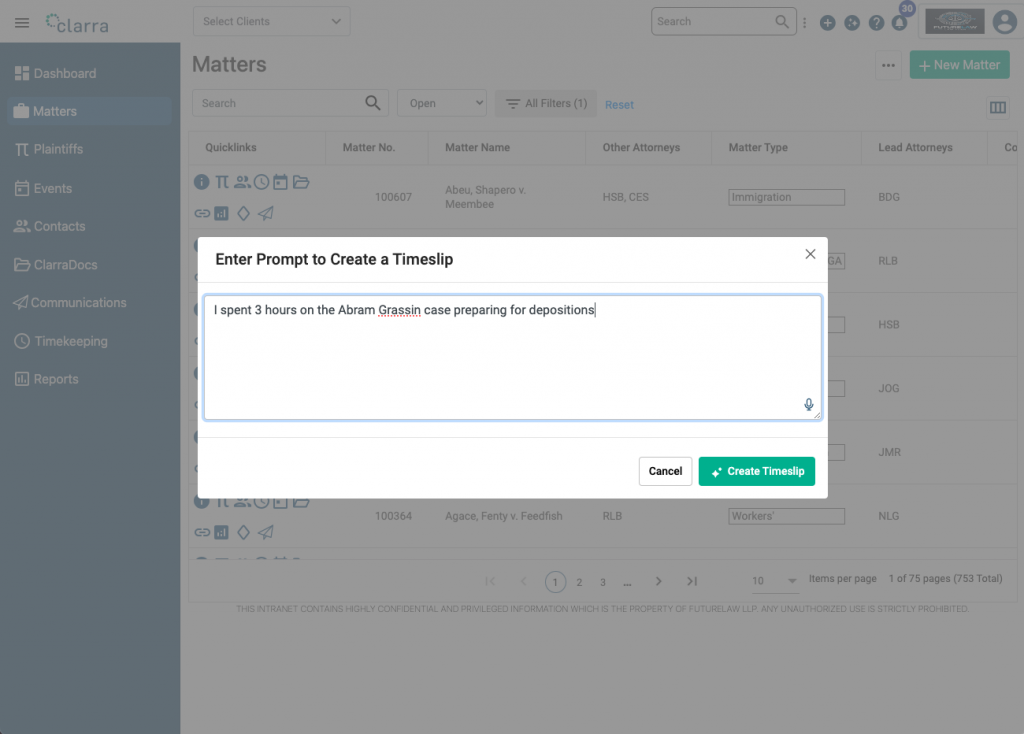
Case Management Platform Clarra Unveils Suite of New Features, Including Gen AI, Analytics and Tracking of Client Communications
It was a year ago last month that I wrote here about the launch of Clarra, a cloud-based case management platform designed to be optimized for docket-driven litigation practices. Now, Clarra is out with a a major update that provides a suite of new features, including generative AI and analytics capabilities, enhanced client-communications capabilities, no-code customization, and more.
“This has been an exciting year marked by an unflagging interest in what we offer: a customizable docket-driven case management solution that allows law firms and in-house counsel teams to manage the complexity of litigation,” said Clarra CEO Keao Caindec, who cofounded the company with San Francisco litigator Todd M. Schneider.
“With these new features and our commitment to simplicity, Clarra is even more responsive to the needs of our customers, allowing them to leverage the latest technology and no-code flexibility to manage cases of any size or complexity.”
Last week, Caindec gave me a briefing and demonstration of the new features and capabilities.
Modern Tech Stack
Before even getting to the new features, Caindec addressed what he sees as one of Clarra’s key advantages over its competitors – its modern tech stack.
Many legal tech vendors are throttled in their development by outdated infrastructures and the need to unify disparate tech stacks due to acquisitions of legacy software, Caindec maintains.
“Legal tech providers have a lot of technical debt from decades-old technologies that must be updated, integrated with other platforms, or rebuilt from the ground up,” he told me. “Most of them are so old that they must rebuild. It’s just not worth building on old, old technology to develop a modern cloud application.”
By contrast, Clarra has built its platform on a modern, cloud-hosted tech stack, specifically leveraging Microsoft Azure, he said. This approach not only provides a more agile and adaptable base but also enables faster deployment.
For law firms, one benefit of that is that Clarra can be more rapidly deployed than other platforms, which often take months to implement. Clarra promises a setup time of one to two months for firms with thousands of matters.
This tech-forward approach makes Clarra particularly attractive for law firms looking to migrate away from older systems or avoid the pitfalls of merging incompatible tech stacks, Caindec said. Additionally, Clarra’s compatibility with Azure enhances scalability, allowing it to support firms of varying sizes and practice areas more effectively.
No-Code Customization
Another distinguishing feature of Clarra is its no-code customization capability, Caindec said, allowing users to personalize their workflows and terminologies to match the specific needs of different types of legal practices.
For instance, while some firms may use the terms “case” and “client,” others may prefer “matter” and “plaintiff.” Clarra’s platform allows for quick, user-driven changes in terminology and data fields, without the need for technical intervention. This flexibility extends to practice areas, where each area can have tailored configurations.
The no-code interface is user-friendly, enabling non-IT professionals within law firms — such as supervising paralegals or business managers — to manage and modify the system independently, Caindec said.
He said that this capability has been beneficial for firms with diverse needs, from small personal injury firms to large defense litigation practices. The platform’s flexibility helps prevent the bottlenecks often associated with customizing legacy systems, giving law firms greater control over their workflows.
Generative AI Integration
Among its new features, Clarra now integrates generative AI to streamline various processes, particularly around document management and timekeeping. With these AI features, users can perform tasks such as auto-generating timeslips, summarizing documents, and extracting dates from documents to simplify calendaring.

With the gen AI integration, users can enter a natural language prompt to create a timeslip.
Clarra has partnered with Microsoft Azure AI to provide these capabilities, enabling users to input details using natural language, from which the AI can automatically classify tasks and associate them with the correct matter or case.
The AI functionality extends to document handling, where it can extract critical dates and docketing information from files as you upload them, reducing the manual work of entering deadlines and tracking case-related events.
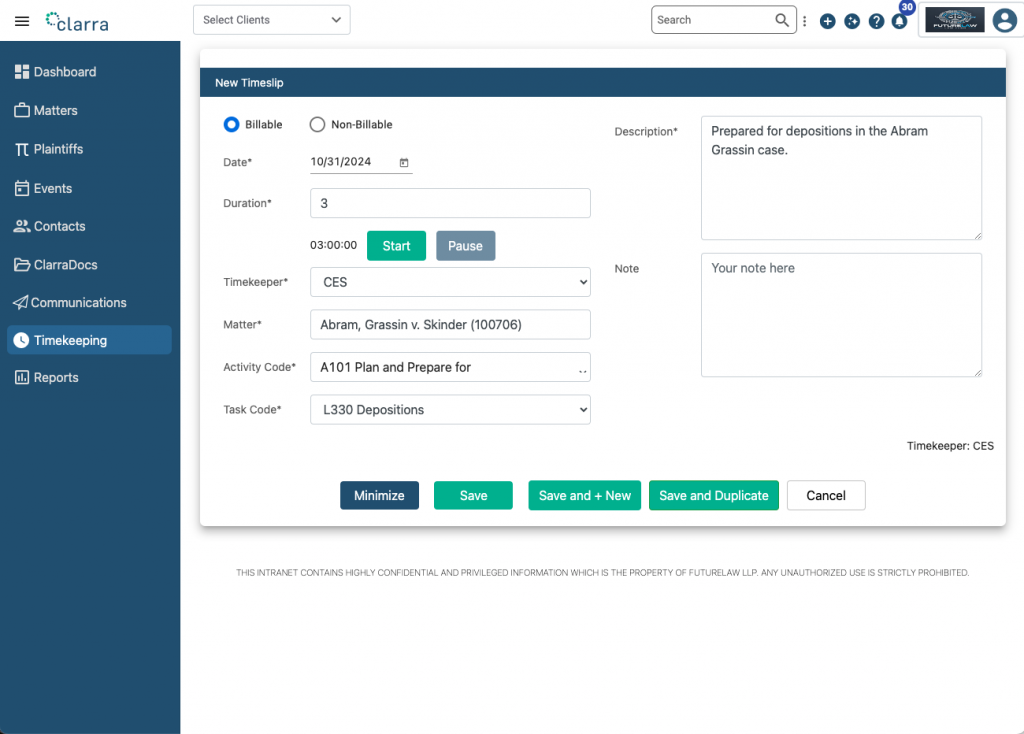
The AI will create a timeslip and add the appropriate task and activity codes.
By automatically processing essential information, Caindec said, Clarra’s AI integration ensures that critical dates are not missed and that workflows remain uninterrupted.
Integration with Domo for Custom Analytics
Although Clarra already provided standard reports, it has now added integration with the data analytics and business intelligence platform Domo, enabling its customers to access and customize a range of reports and visualizations through dashboards.
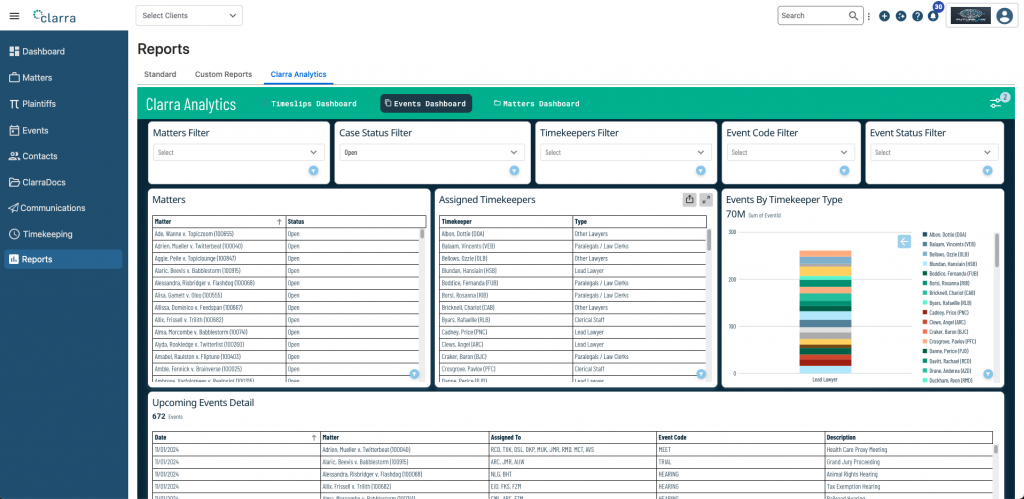
Integration with Domo allows any number of tailored analytics dashboards within Clarra.
The integration, which requires a separate Domo subscription, is designed to offer real-time insights, enabling firms to track important metrics such as time spent on a matter, budget usage, and overall case progress.
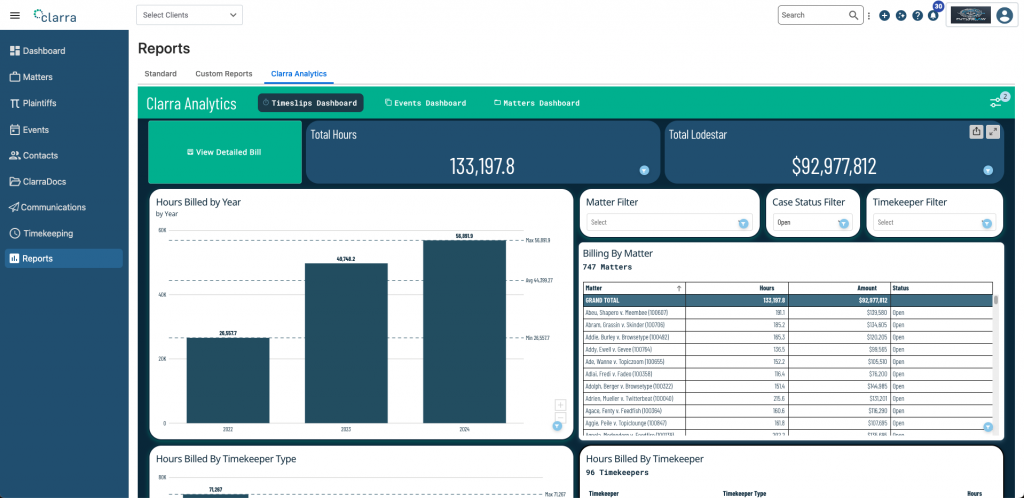
A timekeeping dashboard using the Domo integration.
By enabling firms to create tailored reports, Caindec said, Clarra’s Domo integration addresses a common frustration in the industry: the lack of actionable insights from standard reports. Now, Clarra’s customers can generate comprehensive reports on demand, providing them with deeper insights into operations and better decision-making.
Enhanced Document Management
Recognizing law firms’ need for seamless document and docketing management, Clarra integrates with popular document management solutions such SharePoint, iManage, and NetDocuments. But the platform’s CarraDocs feature also allows users to assign actionable attributes to documents, such as indicating whether they require docketing and tracking any subsequent actions.
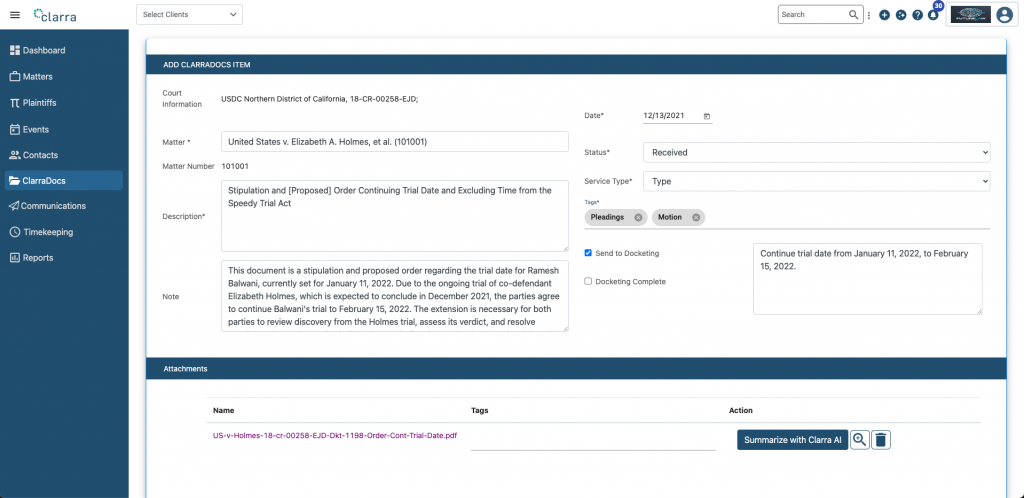
When a document is uploaded, the AI creates a summary and extracts key information.
This functionality not only saves time but also ensures that documents are managed in compliance with legal standards and firm requirements, Caindec said.
This feature has practical applications for tracking responses and orders related to cases, as it enables users to confirm that docketing actions have been completed and generate reports on them.
That can be particularly useful for paralegals and other support staff, who can now ensure a comprehensive audit trail for case-related documents without needing to rely on separate systems.
Communications Tracking
Clarra has added several enhancements that allow firms to improve the client experience and track email, text and phone communications. In addition, Clarra has integrated with Microsoft Outlook, Gmail, and Twilio to streamline communications tracking.
Users can now log all communications directly within the Clarra platform and connect them to specific matters. Users can also send and receive Outlook, Gmail and Twilio messages without leaving the platform.
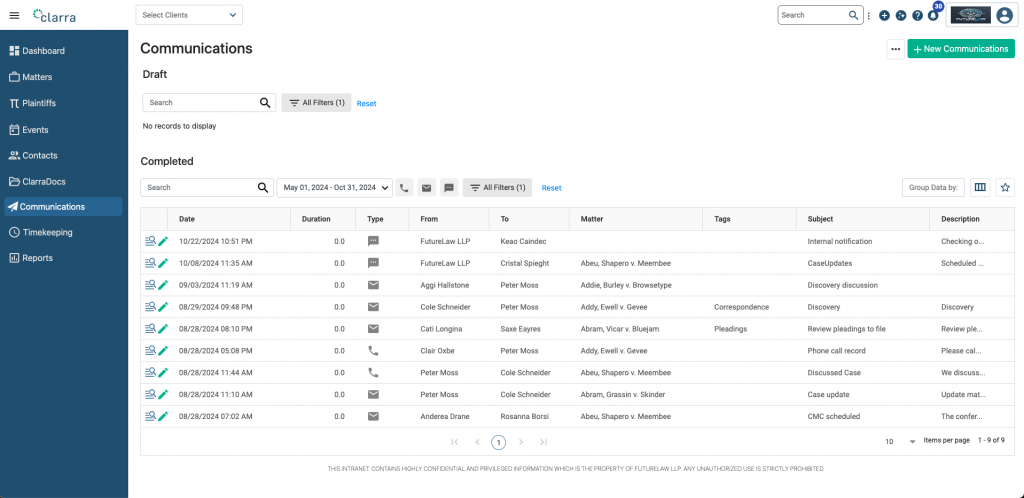
Track client emails and texts within the platform.
For firms that prefer to track communications as part of their document management, Clarra also provides a feature to save emails as PDFs with attached metadata, facilitating retrieval and compliance with data retention policies.
Communications tracking ensures that law firms maintain complete records of all client interactions, which is essential for legal compliance and effective case management, Caindec said.
Plaintiff Management
Caindec said that one of Clarra’s strengths is its ability to serve both plaintiff and defense practices, as well as various industries beyond traditional law firms.
To that end, Clarra has added new plaintiff management capabilities that allow users to keep track of the complex relationships and information related to legal matters, sub-matters and plaintiffs.
For plaintiffs’ firms, Clarra’s customizable structure allows cases and plaintiffs to be organized and tracked according to the firms’ preferred intake models, while defense firms have access to features that support multi-district litigation and complex hierarchies.
The platform’s versatility has also attracted clients from legally-adjacent fields, including claimant management companies, private investigators, forensics companies, and public adjusters, Caindec said.
“With these additional features, Clarra will continue to disrupt the marketplace and capture the interest of not only litigation firms but also businesses that handle cases and claims in general, such as insurance adjusters and legal support services, as well as entertainment companies and enterprises managing licensing, rights and intellectual property,” cofounder Schneider said in a statement provided by the company.
“There are even more exciting developments ahead as we aim to bring simplicity and modernization to case management.”
Leave a Comment